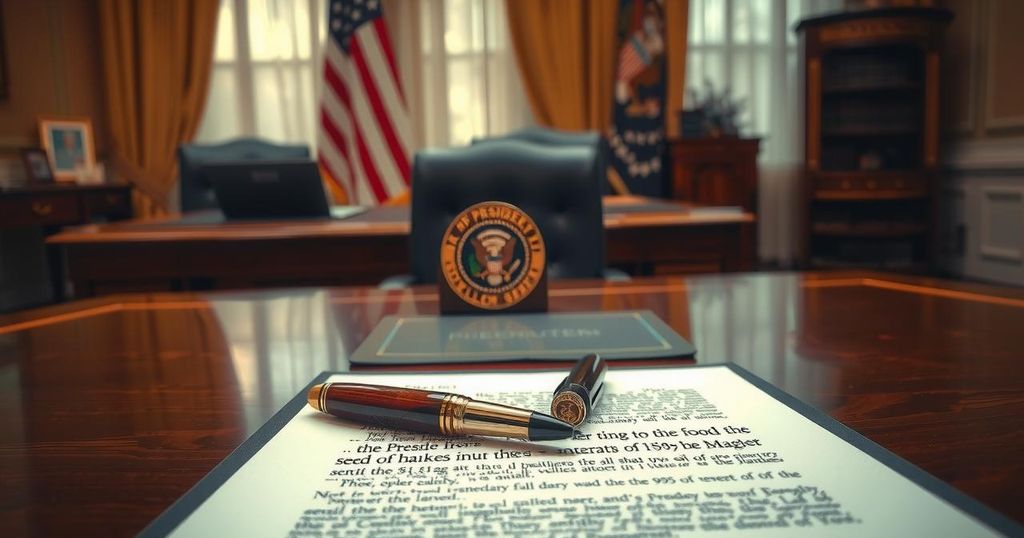World news
AMERICA, ANNA KELLY, ASIA, CARTEL, CIA, CLAUDIA SHEINBAUM, DONALD TRUMP, HERITAGE FOUNDATION, KELLY, MEXICO, NATIONAL SECURITY, NORTH AMERICA, ORGANIZED CRIME, PHILIPPINES, POLITICS, SHE, SHEINBAUM, TRUMP, TRUMP ADMINISTRATION, U. S, U.S. ELECTIONS, UNITED STATES, UNITED STATES ARMY, WALL STREET JOURNAL, WHITE HOUSE
Marisol Gonzalez
0 Comments
Mexican President Sheinbaum Rejects U.S. Military Aid in Drug War Efforts
Mexican President Claudia Sheinbaum declined U.S. military support from President Trump to fight drug cartels, emphasizing the importance of sovereignty. Despite collaboration on border security, challenges persist as both leaders navigate the complexities of drug-related violence and necessary protective measures. Trump’s classification of cartels as foreign terrorist organizations adds urgency to the discussion, reinforcing the need for coordinated efforts in addressing these issues.
Mexican President Claudia Sheinbaum has made headlines by rejecting an offer from President Donald Trump to send U.S. troops to assist in the fight against drug cartels. After a Wall Street Journal report circulated on Friday detailing the offer, Sheinbaum confirmed, “it’s true,” and noted that she firmly declined the proposal. In a conversation with Trump, she emphasized, “we will never accept” the presence of U.S. military forces in Mexico.
During her discussion with Trump, who sought to inquire about how the U.S. could help combat drug trafficking, Sheinbaum reiterated that Mexico’s sovereignty is non-negotiable. “No, President Trump, our territory is inalienable, sovereignty is inalienable,” she stated. While expressing her willingness to collaborate, she insisted that such cooperation should occur within their respective borders, allowing for the sharing of intelligence but barring any military presence.
White House Deputy Press Secretary Anna Kelly weighed in on the matter via a statement to Fox News Digital on Saturday. She highlighted that Trump and Sheinbaum’s dialogue aimed at bolstering border security cooperation has hit unprecedented levels. Kelly asserted that their collaborative work has yielded operational successes, evidenced by cartel leaders being extradited to the U.S. and progress toward securing the border more thoroughly than ever before.
Consistently, Trump has employed CIA drones for surveillance operations within Mexico, aligning these efforts with the Mexican government. The administration has further classified certain drug cartels as “foreign terrorist” organizations to heighten the urgency of addressing the issue.
In her remarks, Kelly regrettably noted that more proactive measures by Mexico are necessary to safeguard American citizens from the threats posed by these organizations. She voiced a committed stance, saying, “We will continue exploring ways to enhance our efforts across the region to dismantle these transnational criminal organizations. We will make America safe again.”
The Heritage Foundation also made waves earlier this year by publishing a report that underscored Trump’s options for leveraging the military against the border crisis. Their findings pointed out an escalation in cartel activity, illegal immigration, and drug trafficking, suggesting a decline in U.S.-Mexico security cooperation. However, they cautioned that any direct military action should be a last resort and prefer such efforts to happen in concert with Mexico.
They elaborated that unilateral U.S. military involvement might be necessary if the Mexican government remains resistant to cooperation in tackling cartel operations. Nonetheless, the foundation felt that under Sheinbaum’s leadership, Mexican resistance would likely continue in the face of escalating cartel threats. Fox News Digital’s reporting contributed to this coverage alongside the Associated Press.
In summary, President Claudia Sheinbaum’s firm dismissal of President Trump’s offer for U.S. military help in battling drug cartels highlights Mexico’s strong stance on sovereignty. While both nations are collaborating on border security initiatives, challenges remain. Ongoing discussions continue, reflecting the complex dynamics of U.S.-Mexico relations in tackling drug-related issues. As President Trump and Sheinbaum engage further, the approach to combat these security concerns appears crucial moving forward.
Original Source: www.foxnews.com




Post Comment